Fleurs du Mal Magazine


Or see the index

The Ragged Wood
O hurry where by water among the trees
The delicate-stepping stag and his lady sigh,
When they have but looked upon their images –
Would none had ever loved but you and I!
Or have you heard that sliding silver-shoed
Pale silver-proud queen-woman of the sky,
When the sun looked out of his golden hood? –
O that none ever loved but you and I!
O hurry to the ragged wood, for there
I will drive all those lovers out and cry –
O my share of the world, O yellow hair!
No one has ever loved but you and I.
William Butler Yeats
(1865-1939)
The Ragged Wood
• fleursdumal.nl magazine
More in: Archive Y-Z, Archive Y-Z, Yeats, William Butler
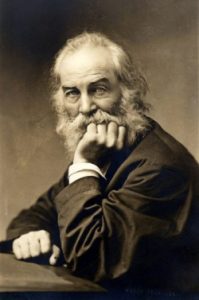
A Noiseless Patient Spider
A noiseless patient spider,
I mark’d where on a little promontory it stood isolated,
Mark’d how to explore the vacant vast surrounding,
It launch’d forth filament, filament, filament, out of itself,
Ever unreeling them, ever tirelessly speeding them.
And you O my soul where you stand,
Surrounded, detached, in measureless oceans of space,
Ceaselessly musing, venturing, throwing, seeking the spheres to connect them,
Till the bridge you will need be form’d, till the ductile anchor hold,
Till the gossamer thread you fling catch somewhere, O my soul.
Walt Whitman
(1819 – 1892)
A Noiseless Patient Spider
• fleursdumal.nl magazine
More in: Archive W-X, Archive W-X, Whitman, Walt

Nachtbild
Heil dem Lebend’gen, der mit voller Hand
Sich zu den Armen und Verlassenen wendet,
Der seinen Trost aus kühlen Bronnen spendet.
Heil dem Propheten in der Sonne Brand!
Dranmor.
Nacht bedeckt den kleinen Friedhof.
In dem dumpfen Leichenhause
Flackert zitternd einer Lampe
Rothe Flamme. – Heiser knarren
Jene Thüren, die das Leben
Sorgsam von dem Tode trennen.
Meine Hand hat sichern Druckes
Sie geöffnet; wie im Schlafe
Aber wandelnd, dacht’ ich nimmer,
Sie zu schließen. –
Leise, wie mit Geisterstimmen
Klagt der Wind dort in den Weiden,
Pochet zürnend an die Fenster,
Flüstert mit den kranken Blumen,
Die aus der Verwesung sprießen,
Treibet mit den Wetterhähnen
Auf dem Thurm sein ächzend Spiel,
Flieget wimmernd um das Häuschen,
Daß die Fenster ängstlich klirren
Und die Flamme furchsam zuckt …
Jener bangen rothen Flamme
Schwankend Leuchten schien ein Winken,
Dem ich folgte, traumbefangen,
Und nun steh’ ich in dem engen
Schaurig-öden, kahlen Stübchen, –
Ich allein bei einem Todten.
––––––––––––––––––––
Auf zwei Schragen und zwei Brettern
Ruht der Todte, alt und häßlich,
Nur in Lumpen eingehüllet;
Ihm zu Haupte brennt die Lampe,
Deren zuckend rothe Lichter
Öfter wie ein Lächeln gleiten
Über die erstarrten Züge
Des verkommenen Gesellen.
Eine harmlos gläub’ge Hand
Suchte seine wildgeballten,
Nun im Tod gekrampften Hände
Fromm zu falten, wie bei Jenen,
Deren Leben schloß ein Beten. –
Auf zwei Schragen und zwei Brettern
Ruht der Todte, still und einsam,
Schläft den letzten, traumlos, leeren,
Ewigen Schlaf…..
Noch am Morgen jagten Bosheit,
Breit Behagen – dem das Elend
Unverständlich – Rohheit, Kaltsinn
Ruhlos ihn von Thür zu Thüre,
Und des Abends wankte jener
Unglücksel’ge, wie betrunken,
Durch die Straßen. Hunger weinte
Aus den kranken, trock’nen Augen,
Aber Trotz zuckt um die Lippen,
Als die Buben, die ihm folgten,
Näher trabten, um das Unthier
Zu beschauen, das man eben
Auf Befehl der weisen, milden
Obrigkeit von dannen hetzet.
Vagabund! so klingt es lachend
Aus dem Munde wilder Kinder;
Vagabund! so klingt es höhnend
Aus dem Mund der klugen Alten;
Vagabund! schreit roh der Büttel;
Vagabund! so ächzt er selber,
Weitertaumelnd. – – –
An der Straße, bei der Grenze
Todesmüde sinkt er nieder.
Fern verklinget das Gejohle
Jener tugendsamen Meute,
Die ihn hetzte und befriedigt
Von dem Schauspiel heim jetzt kehret
Zu dem Herde. –
Dunkel senket schon die Nacht sich
Nieder auf die stille Erde,
Und es senket auch die Nacht sich
Nieder auf die dunkle Seele
Des Gehetzten, des Verfluchten;
Über seinem armen Antlitz,
Grau, wie Spinngeweb’ gebreitet,
Liegen Elend und Verzweiflung.
Stumm umklammert er den Grenzstein
Und starrt finster nach dem einz’gen
Trüben Sterne, der herabschaut,
Auf sein Elend. –
Und es lösen von dem Steine
Los sich seine feuchten Hände
Und sie zucken, zittern, haschen
Nach den dunklen Nebelschatten.
Wild empor sind sie gerichtet,
Eine stumme, fürchterliche,
Himmelstürmend, crasse Drohung,
Wild empor noch schreit der Augen
Gottverneinend herbe Klage.
Aber plötzlich sinken nieder
Seine Arme; es verlöschen
Seiner Blicke letzte Blitze.
Von dem schwarzen Himmel knisternd
Fällt der einz’ge Stern hernieder,
Und ein Windstoß, zaust die Haare
Einer Leiche …..
–––––––––––––––––
War es wie bei jenen Geiern,
Die da wittern, wo das Aas liegt,
Das sie nährt sammt ihren Jungen?
War es des Geschäftes Eifer,
Der ihn trieb, Dich aufzusuchen?
Denn es fand Dich, der berufen,
Sich zu nähren von den Todten,
An dem Grenzstein fand Dich, einsam,
Kalt und todt der – Todtengräber.
Mit den rauhen, derben Händen
Trug er selbst Dich in das Stübchen,
Das bestimmt ist für die Leichen
Jener, die am Wege sterben;
Für die Gott- und Weltverlass’nen
Ist dies Stübchen, ist der Schragen. –
Morgen aber scharret ein Dich,
Dort im letzten Friedhofwinkel,
Einsam, wie er Dich gefunden,
Für gar kargen Lohn der Alte,
Er allein kann Dich verwerthen:
Tod ist Brot ihm! –
Und doch trug auf seinen Händen
Dich ein Mensch zum Ort des Friedens,
Und es schlug ein Menschenherz
Einmal doch an Deinem Herzen…..
Schaurig Mitleid: Dich verspottend
Noch im Tode, giebt er Dir nun,
Was im Leben Dir wohl nimmer
Ist geworden: Licht und Ruhe
Dach und Hände, die Dich nimmer
Von sich stoßen! ….
–––––––––––––––––––
Nacht bedeckt den kleinen Friedhof,
In dem dumpfen Leichenhause
Flackert ängstlich knisternd, zuckend,
Jener Lampe rothe Flamme,
Deren Schwanken mir ein Winken,
Dem ich folgte traumbefangen –
Und noch steh’ ich in dem engen
Schaurig-öden, kahlen Stübchen, –
Ich alleine bei dem Todten!
Ada Christen
(1839 – 1901)
Nachtbild
1878
• fleursdumal.nl magazine
More in: Archive C-D, Archive C-D, Christen, Ada
De poëzie van Ruth Lasters is aards, wil aards zijn.
 In een weloverwogen syntaxis, met een voorkeur voor het onverwachte perspectief en een warm hart voor de zwakkeren, componeert ze versbeelden die afwijkend zijn en energiek, muzikaal en beeldend.
In een weloverwogen syntaxis, met een voorkeur voor het onverwachte perspectief en een warm hart voor de zwakkeren, componeert ze versbeelden die afwijkend zijn en energiek, muzikaal en beeldend.
Tijgerbrood gaat over het verlangen om voor altijd toevlucht te kunnen zoeken, op te lossen in pure vorm, in woordenloosheid. De auteur is haar vroegere compartimenten kwijt.
De dichter, leerkracht, kindervrije vrouw, partner, pacifist, klimaattobber en kunstliefhebber werden samengekneed tot één wezen dat haar hoop, bekommernissen en angsten meer en meer durft te erkennen als die van iedereen.
Als brood leven is, zoals men zegt, is tijgerbrood een leven in camouflagevel om als observator ongehinderd de stem te kunnen opvangen van de hele maatschappij.
Auteur(s) : Ruth Lasters
Uitgeverij: Uitgeverij G.A. Van Oorschot
ISBN: 9789028231030
Taal: Nederlands
Uitvoering: Paperback
Aantal pagina’s: 80
Verschijningsdatum: februari 2023
Afmetingen: 220 x 140 x 10 mm.
Paperback 19.50
• fleursdumal.nl magazine
More in: #Editors Choice Archiv, - Book News, - Bookstores, Archive K-L, Archive K-L
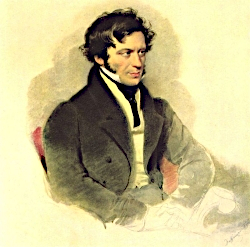
Nichts
Zwischen nichts wissen und Nichts wissen –
In diese zwei Teile ist die Menschheit zerrissen.
Aber Nichts wissen
Ist fruchtlos bis zum Tode beflissen,
Indeß nichts wissen
Ein gottgefälliges Ruhekissen.
Franz Seraphicus Grillparzer
(Wien 1791 – 1872)
Nichts
• fleursdumal.nl magazine
More in: # Classic Poetry Archive, Archive G-H, Archive G-H, Grillparzer, Franz
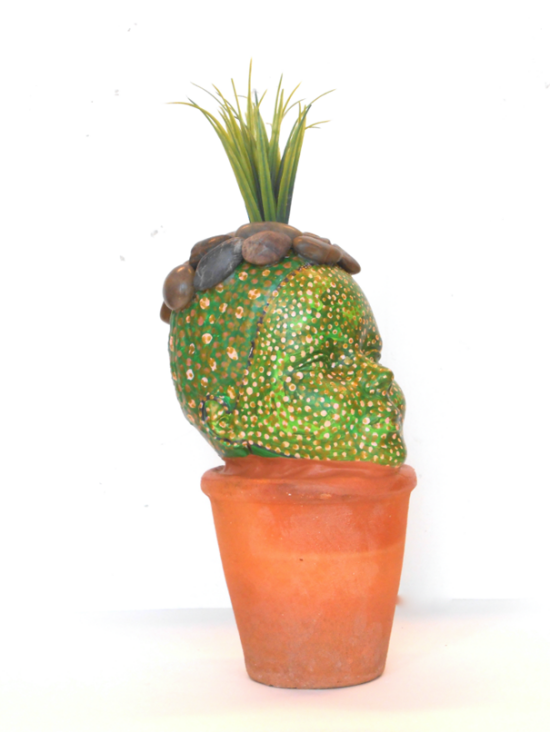
Zijn tuin een pot…
Wanneer het hoofd versteent,
gedachten als platte keien
op het denken drukken
wordt aanvaarden eenvoudig.
Wanneer leven aan het hoofd
ontkiemt, vindt het z’n oorsprong
in baarmoeder na baarmoeder.
Albert Hagenaars
Saat kepala berubah menjadi batu,
pikiran-pikiran terbeban seperti
pipihnya batu di atas proses pemikiran
menerima menjadi mudah.
Saat kehidupan timbul dari kepala,
dia menemukan asal-usulnya
dalam kandungan ke kandungan.
SAMENVAL / GABUNGAN
In de zomer van 2023 zal Samenval / Gabungan verschijnen, een boek met afbeeldingen van schilderijen en sculpturen van Edith Bons en daarbij geschreven gedichten van Albert Hagenaars. Alle tekst is in het Nederlands en Indonesisch.
Een voorpublicatie verschijnt nu in Fleurs du Mal Magazine.
De eerste stap in het proces dat tot het project Samenval/Gabungan zou leiden, werd gezet in het Indonesisch-Nederlands Cultureel Centrum Karta Pustaka in Yogyakarta, hoofdstad van de Javaanse cultuur. Al in 1986 mocht Edith Bons daar een expositie inrichten. Het was haar eerste activiteit in Indonesië, waar zij werd geboren en een deel van haar jeugd doorbracht.
Jaren later volgde Siti Wahyuningsih uit het nabije Pundong met het oog op haar huwelijk met Albert Hagenaars en verhuizing naar Europa een cursus Nederlands in hetzelfde centrum. Tijdens een bezoek daar kwamen beiden in contact met theaterman en dichter Landung Simatupang, die Alberts poëziebundel Tropendrift in Bahasa Indonesia zou vertalen.
In 2007 ontving Edith Bons de uitnodiging om een installatie in Karta Pustaka in te richten. Tijdens een plechtigheid in het centrum stelde Landung Simatupang Albert en Siti voor aan de dichter Winarko Boesrie en diens vrouw Edith Bons.
Dit contact kon zich zowel in Nederland als op Java verdiepen, wat herhaaldelijk tot vormen van samenwerking leidde.
Albert Hagenaars kreeg zodoende steeds meer affiniteit met het werk van Edith. In 2018 stelde hij daarom voor om gedichten bij haar werk te maken. Aanvankelijk dacht hij aan enkele verzen voor een catalogus maar gaandeweg groeide het plan uit tot het boek Samenval / Gabungan, met veertig schilderijen en sculpturen en evenzoveel daarbij geschreven gedichten.
Barney Agerbeek schreef de inleiding van het boek. Deze romancier, dichter en kunstkenner, geboren in Surabaya en wonend in Nederland, werkte lange tijd als bankier in Indonesië. Hij gebruikte zijn ervaringen daar en in andere landen in diverse boeken.
Samenval / Gabungan is aldus het resultaat van een langdurige samenwerking van kunstenaars die in vriendschap verbonden zijn door eenzelfde passie: nieuwsgierigheid naar interculturele interactie, liefde voor Indonesië en het versterken van begrip over en weer.
Titel: SAMENVAL / GABUNGAN
(Gabungan betekent overlapping)
Auteurs tekst en beeld: Albert Hagenaars & Edith Bons
Voorwoord: Cultureel attaché Indonesische ambassade
Inleiding: Barney Agerbeek (auteur en kunstkenner)
Ontwerp omslag: Edith Bons
Foto achterzijde en vertaling: Siti Wahyuningsih
Opmaak: HostWriters (België)
Uitgeverij: Amazon
ISBN: 9798397846103
Prijs: € 20,00
Verschijningsdatum: 1 augustus 2023
• fleursdumal.nl magazine
More in: - Book News, - Bookstores, Albert Hagenaars, Archive G-H, Archive G-H, Art & Literature News, Edith Bons, Hagenaars, Albert
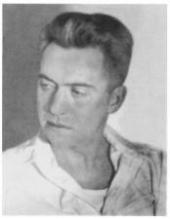
Praise for an Urn
[In Memoriam: Ernest Nelson]
It was a kind and northern face
That mingled in such exile guise
The everlasting eyes of Pierrot
And, of Gargantua, the laughter.
His thoughts, delivered to me
From the white coverlet and pillow,
I see now, were inheritances–
Delicate riders of the storm.
The slant moon on the slanting hill
Once moved us toward presentiments
Of what the dead keep, living still,
And such assessments of the soul
As, perched in the crematory lobby,
The insistent clock commented on,
Touching as well upon our praise
Of glories proper to the time.
Still, having in mind gold hair,
I cannot see that broken brow
And miss the dry sound of bees
Stretching across a lucid space.
Scatter these well-meant idioms
Into the smoky spring that fills
The suburbs, where they will be lost.
They are no trophies of the sun.
Hart Crane
(1889 – 1932)
Praise for an Urn
• fleursdumal.nl magazine
More in: Archive C-D, Archive C-D, Crane, Hart

To A Western Boy
O boy of the West!
To you many things to absorb, I teach,
to help you become eleve of mine:
Yet if blood like mine circle not in your veins;
If you be not silently selected by lovers,
and do not silently select lovers,
Of what use is it that you seek to become eleve of mine?
Walt Whitman
(1819 – 1892)
To A Western Boy
• fleursdumal.nl magazine
More in: Archive W-X, Archive W-X, Whitman, Walt
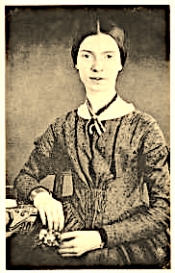
This is my letter to the world
This is my letter to the world,
That never wrote to me, —
The simple news that Nature told,
With tender majesty.
Her message is committed
To hands I cannot see;
For love of her, sweet countrymen,
Judge tenderly of me!
Emily Dickinson
(1830-1886)
This is my letter to the world
• fleursdumal.nl magazine
More in: Archive C-D, Archive C-D, Dickinson, Emily

Wie is er bang voor groen?
Wie bang is voor groen, is bang
voor het leven, het leven
van zaadgroen en kiemgroen,
van navelgroen, bloedgroen
en liefdesgroen en stiltegroen,
van doodwit.
Albert Hagenaars
Siapa yang takut dari kehijauan, takut
dari kehidupan, kehidupan
dari hijaunya berbijian dan hijaunya benih,
dari hijaunya pusar, hijaunya darah,
hijaunya cinta dan hijaunya keheningan,
dari putihnya kematian.
SAMENVAL / GABUNGAN
In de zomer van 2023 zal Samenval / Gabungan verschijnen, een boek met afbeeldingen van schilderijen en sculpturen van Edith Bons en daarbij geschreven gedichten van Albert Hagenaars. Alle tekst is in het Nederlands en Indonesisch.
Een voorpublicatie verschijnt nu in Fleurs du Mal Magazine.
De eerste stap in het proces dat tot het project Samenval/Gabungan zou leiden, werd gezet in het Indonesisch-Nederlands Cultureel Centrum Karta Pustaka in Yogyakarta, hoofdstad van de Javaanse cultuur. Al in 1986 mocht Edith Bons daar een expositie inrichten. Het was haar eerste activiteit in Indonesië, waar zij werd geboren en een deel van haar jeugd doorbracht.
Jaren later volgde Siti Wahyuningsih uit het nabije Pundong met het oog op haar huwelijk met Albert Hagenaars en verhuizing naar Europa een cursus Nederlands in hetzelfde centrum. Tijdens een bezoek daar kwamen beiden in contact met theaterman en dichter Landung Simatupang, die Alberts poëziebundel Tropendrift in Bahasa Indonesia zou vertalen.
In 2007 ontving Edith Bons de uitnodiging om een installatie in Karta Pustaka in te richten. Tijdens een plechtigheid in het centrum stelde Landung Simatupang Albert en Siti voor aan de dichter Winarko Boesrie en diens vrouw Edith Bons.
Dit contact kon zich zowel in Nederland als op Java verdiepen, wat herhaaldelijk tot vormen van samenwerking leidde.
Albert Hagenaars kreeg zodoende steeds meer affiniteit met het werk van Edith. In 2018 stelde hij daarom voor om gedichten bij haar werk te maken. Aanvankelijk dacht hij aan enkele verzen voor een catalogus maar gaandeweg groeide het plan uit tot het boek Samenval / Gabungan, met veertig schilderijen en sculpturen en evenzoveel daarbij geschreven gedichten.
Barney Agerbeek schreef de inleiding van het boek. Deze romancier, dichter en kunstkenner, geboren in Surabaya en wonend in Nederland, werkte lange tijd als bankier in Indonesië. Hij gebruikte zijn ervaringen daar en in andere landen in diverse boeken.
Samenval / Gabungan is aldus het resultaat van een langdurige samenwerking van kunstenaars die in vriendschap verbonden zijn door eenzelfde passie: nieuwsgierigheid naar interculturele interactie, liefde voor Indonesië en het versterken van begrip over en weer.
Titel: SAMENVAL / GABUNGAN
(Gabungan betekent overlapping)
Auteurs tekst en beeld: Albert Hagenaars & Edith Bons
Voorwoord: Cultureel attaché Indonesische ambassade
Inleiding: Barney Agerbeek (auteur en kunstkenner)
Ontwerp omslag: Edith Bons
Foto achterzijde en vertaling: Siti Wahyuningsih
Opmaak: HostWriters (België)
Uitgeverij: Amazon
ISBN: 9798397846103
Prijs: € 20,00
Verschijningsdatum: 1 augustus 2023
• fleursdumal.nl magazine
More in: - Book News, - Bookstores, Albert Hagenaars, Archive G-H, Archive G-H, Art & Literature News, Edith Bons, Hagenaars, Albert

Nocturne parisien
A Edmond Lepelletier.
Roule, roule ton flot indolent, morne Seine. —
Sous tes ponts qu’environne une vapeur malsaine
Bien des corps ont passé, morts, horribles, pourris,
Dont les âmes avaient pour meurtrier Paris.
Mais tu n’en traînes pas, en tes ondes glacées,
Autant que ton aspect m’inspire de pensées!
Le Tibre a sur ses bords des ruines qui font
Monter le voyageur vers un passé profond,
Et qui, de lierre noir et lichen couvertes,
Apparaissent, tas gris, parmi les herbes vertes.
Le gai Guadalquivir rit aux blonds orangers
En reflète, les soirs, des boléros légers.
Le Pactole a son or. Le Bosphore a sa rive
Où vient faire son kief l’odalisque lascive.
Le Rhin est un burgrave, et c’est un troubadour
Que le Lignon, et c’est un ruffian que l’Adour.
Le Nil, au bruit plaintif de ses eaux endormies,
Berce de rêves doux le sommeil des momies.
Le grand Meschascébé, fier de ses joncs sacrés,
Charrie augustement ses îlots mordorés,
Et soudain, beau d’éclairs, de fracas et de fastes,
Splendidement s’écroule en Niagaras vastes.
L’Eurotas, où l’essaim des cygnes familiers
Mêle sa grâce blanche au vert mat des lauriers,
Sous son ciel clair que raie un vol de gypaète,
Rhytmique et caressant, chante ainsi qu’un poète.
Enfin, Ganga, parmi les hauts palmiers tremblants
Et les rouges padmas, marche à pas fiers et lents,
En appareil royal, tandis qu’au loin la foule
Le long des temples va hurlant, vivante houle,
Au claquement massif des cymbales de bois,
Et qu’accroupi, filant ses notes de hautbois,
Du saut de l’antilope agile attendant l’heure,
Le tigre jaune au dos rayé s’étire et pleure.
— Toi, Seine, tu n’as rien. Deux quais, et voilà tout,
Deux quais crasseux, semés de l’un à l’autre bout
D’affreux bouquins moisis et d’une foule insigne
Qui fait dans l’eau des ronds et qui pêche à la ligne.
Oui, mais quand vient le soir, raréfiant enfin
Les passants alourdis de sommeil ou de faim,
Et que le couchant met au ciel des taches rouges,
Qu’il fait bon aux rêveurs descendre de leurs bouges
Et, s’accoudant au pont de la Cité, devant
Notre-Dame, songer, coeur et cheveux au vent!
Les nuages, chassés par la brise nocturne,
Courent, cuivreux et roux, dans l’azur taciturne.
Sur la tête d’un roi du portail, le soleil,
Au moment de mourir, pose un baiser vermeil.
L’hirondelle s’enfuit à l’approche de l’ombre
Et l’on voit voleter la chauve-souris sombre.
Tout bruit s’apaise autout. A peine un vague son
Dit que la ville est là qui chante sa chanson,
Qui lèche ses tyrans et qui mord ses victimes;
Et c’est l’aube des vols, des amours et des crimes.
— Puis, tout à coup, ainsi qu’un ténor effaré
Lançant dans l’air bruni son cri désespéré,
Son cri qui se lamente, et se prolonge, et crie,
Éclate en quelque coin l’orgue de Barbarie :
Il brame un de ces airs, romances ou polkas,
Qu’enfants nous tapotions sur nos harmonicas
Et qui font, lents ou vifs, réjouissants ou tristes,
Vibrer l’âme aux proscrits, aux femmes, aux artistes.
C’est écorché, c’est faux, c’est horrible, c’est dur,
Et donnerait la fièvre à Rossini, pour sûr;
Ces rires sont traînés, ces plaintes sont hachées;
Sur une clef de sol impossible juchées,
Les notes ont un rhue et les do sont des la,
Mais qu’importe ! l’on pleure en entendant cela !
Mais l’esprit, transporté dans le pays des rêves,
Sent à ces vieux accords couler en lui des sèves;
La pitié monte au coeur et les larmes aux yeux,
Et l’on voudrait pouvoir goûter la paix des cieux,
Et dans une harmonie étrange et fantastique
Qui tient de la musique et tient de la plastique,
L’âme, les innondant de lumière et de chant,
Mêle les sons de l’orgue aux rayons du couchant!
— Et puis l’orgue s’éloigne, et puis c’est le silence
Et la nuit terne arrive et Venus se balance
Sur une molle nue au fond des cieux obscurs;
On allume les becs de gaz le long des murs.
Et l’astre et les flambaux font des zigzags fantasques
Dans le fleuve plus noir que le velours des masques;
Et le contemplateur sur le haut garde-fou
Par l’air et par les ans rouillé comme un vieux sou
Se penche, en proie aux vents néfastes de l’abîme.
Pensée, espoir serein, ambition sublime,
Tout jusqu’au souvenir, tout s’envole, tout fuit,
Et l’on est seul avec Paris, l’Onde et la Nuit!
— Sinistre trinité ! De l’ombre dures portes!
Mané-Thécel-Pharès des illusions mortes!
Vous êtes toutes trois, ô Goules de malheur,
Si terribles, que l’Homme, ivre de la douleur
Que lui font en perçant sa chair vos doigts de spectre,
L’Homme, espèce d’Oreste à qui manque un Électre,
Sous la fatalité de votre regard creux
Ne peut rien et va droit au précipice affreux;
Et vous êtes aussi toutes trois si jalouses
De tuer et d’offrir au grand Ver des épouses
Qu’on ne sait que choisir entre vos trois horreurs,
Et si l’on craindrait moins périr par les terreurs
Des Ténèbres que sous l’Eau sourde, l’Eau profonde,
Ou dans tes bras fardés, Paris, reine du monde!
— Et tu coules toujours, Seine, et, tout en rampant,
Tu traînes dans Paris ton cours de vieux serpent,
De vieux serpent boueux, emportant vers tes havres
Tes cargaisons de bois, de houille et de cadavres!
Paul Verlaine
(1844 – 1896)
Nocturne parisien
Poèmes saturniens
Photo: Willem Witsen, 1892
• fleursdumal.nl magazine
More in: Archive U-V, Archive U-V, Verlaine, Paul
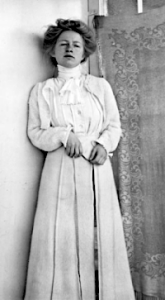
Jag
Jag är främmande i detta land,
som ligger djupt under det tryckande havet,
solen blickar in med ringlande strålar
och luften flyter mellan mina händer.
Man sade mig att jag är född i fångenskap –
här är intet ansikte som vore mig bekant.
Var jag en sten, den man kastat hit på bottnen?
Var jag en frukt, som var för tung för sin gren?
Här ligger jag på lur vid det susande trädets fot,
hur skall jag komma upp för de hala stammarna?
Däruppe mötas de raglande kronorna,
där vill jag sitta och speja ut
efter röken ur mitt hemlands skorstenar…
Edith Södergran
(1892-1923)
Jag
• fleursdumal.nl magazine
More in: Archive S-T, Archive S-T, Södergran, Edith
Thank you for reading Fleurs du Mal - magazine for art & literature